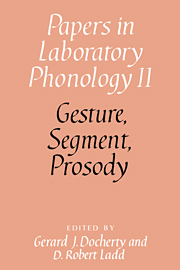Book contents
- Frontmatter
- Contents
- List of contributors
- Acknowledgments
- Introduction
- Section A Gesture
- Section B Segment
- 6 An introduction to feature geometry
- 7 The segment: primitive or derived?
- 8 Modeling assimilation in nonsegmental, rule-free synthesis
- 9 Lexical processing and phonological representation
- 10 The descriptive role of segments: evidence from assimilation
- 11 Psychology and the segment
- 12 Trading relations in the perception of stops and their implications for a phonological theory
- Section C Prosody
- Appendix 1 The test phrases (bold type) of experiment 1 in the context in which they were read
- Appendix 2 The distractors (bold type) of experiment 1 in the context in which they were read
- Appendix 3 The test sentences of experiment 2. The test words are in bold type
- Appendix 4 The distractor sentences of experiment 2. The distractors are in bold type
- References
- Name index
- Subject index
8 - Modeling assimilation in nonsegmental, rule-free synthesis
from Section B - Segment
Published online by Cambridge University Press: 18 December 2009
- Frontmatter
- Contents
- List of contributors
- Acknowledgments
- Introduction
- Section A Gesture
- Section B Segment
- 6 An introduction to feature geometry
- 7 The segment: primitive or derived?
- 8 Modeling assimilation in nonsegmental, rule-free synthesis
- 9 Lexical processing and phonological representation
- 10 The descriptive role of segments: evidence from assimilation
- 11 Psychology and the segment
- 12 Trading relations in the perception of stops and their implications for a phonological theory
- Section C Prosody
- Appendix 1 The test phrases (bold type) of experiment 1 in the context in which they were read
- Appendix 2 The distractors (bold type) of experiment 1 in the context in which they were read
- Appendix 3 The test sentences of experiment 2. The test words are in bold type
- Appendix 4 The distractor sentences of experiment 2. The distractors are in bold type
- References
- Name index
- Subject index
Summary
Introduction
Only relatively recently have phonologists begun the task of seriously testing and evaluating their claims in a rigorous fashion. In this paper, I attempt to sustain this task by discussing a computationally explicit version of one kind of structured phonology, based on the Firthian prosodic approach to phonological interpretation, which is implemented as an intelligent knowledge-based “front-end” to a laboratory formant speech synthesizer (Klatt 1980). My purpose here is to report on how the superiority of a structured monostratal approach to phonology over catenative segmental approaches can be demonstrated in practice. The approach discussed here compels new standards of formal explicitness in the phonological domain as well as a need to pay serious attention to parametric and temporal detail in the phonetic domain (see Browman and Goldstein 1985, 1986). The paper falls into two parts: the first outlines the nonsegmental approach to phonological interpretation and representation; the second gives an overview of the way “process” phenomena are treated within this rule-free approach and presents an analysis of some assimilatory phenomena in English and the implementation of that analysis within the synthesis model. Although the treatment of assimilation presented here is similar to some current proposals (e.g. Lodge 1984), it is, to the best of my knowledge, unique in having been given an explicit computational implementation.
- Type
- Chapter
- Information
- Gesture, Segment, Prosody , pp. 190 - 228Publisher: Cambridge University PressPrint publication year: 1992
- 4
- Cited by



